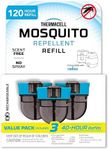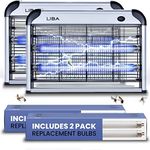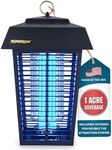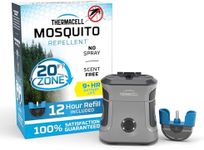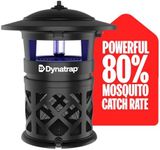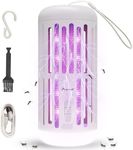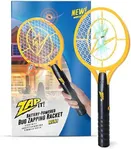Buying Guide for the Best Mosquito Killers
Choosing the right mosquito killer can significantly improve your comfort and health, especially in areas where mosquitoes are prevalent. The right product will depend on your specific needs, such as the size of the area you need to cover, whether you prefer a chemical-free solution, and how portable you need the device to be. Understanding the key specifications will help you make an informed decision and ensure you get the most effective mosquito killer for your situation.Coverage AreaCoverage area refers to the maximum space that the mosquito killer can effectively protect. This is important because it determines how large of an area the device can keep mosquito-free. Coverage areas can range from small personal spaces (like a bedroom) to large outdoor areas (like a backyard). If you need to protect a small indoor space, a device with a coverage area of up to 500 square feet may be sufficient. For larger indoor spaces or small outdoor areas, look for devices that cover up to 1,000 square feet. For extensive outdoor areas, you might need a device that covers 1,500 square feet or more. Choose a mosquito killer with a coverage area that matches the size of the space you need to protect.
Type of Mosquito KillerThere are several types of mosquito killers, including electric zappers, traps, ultrasonic repellents, and chemical sprays. Electric zappers use UV light to attract and then electrocute mosquitoes. Traps lure mosquitoes with attractants and then trap them inside. Ultrasonic repellents emit high-frequency sounds that are supposed to repel mosquitoes. Chemical sprays use insecticides to kill mosquitoes on contact. If you prefer a chemical-free solution, electric zappers or ultrasonic repellents might be the best choice. For more aggressive mosquito control, traps or chemical sprays could be more effective. Consider your preferences and any health concerns when choosing the type of mosquito killer.
Power SourceMosquito killers can be powered by electricity, batteries, or solar energy. The power source is important because it affects the device's portability and where it can be used. Electric-powered devices need to be plugged into an outlet, making them suitable for indoor use or areas with accessible power sources. Battery-powered devices offer more portability and can be used in areas without electricity, but they require regular battery replacements or recharging. Solar-powered devices are eco-friendly and ideal for outdoor use, as they harness energy from the sun. Choose a power source that fits your intended use and convenience.
Noise LevelThe noise level of a mosquito killer can impact your comfort, especially if you plan to use it in a living or sleeping area. Some devices, like electric zappers, can produce a noticeable buzzing or zapping sound when they kill mosquitoes. Ultrasonic repellents emit high-frequency sounds that may be audible to some people. Traps and chemical sprays are generally quieter. If you are sensitive to noise or plan to use the device in a quiet environment, look for a mosquito killer with a low noise level. Check user reviews and product descriptions to gauge the noise level before making a purchase.
Safety FeaturesSafety features are crucial, especially if you have children or pets. Some mosquito killers, like electric zappers, have protective cages to prevent accidental contact with the electrified grid. Chemical sprays should be used with caution and stored out of reach of children and pets. Ultrasonic repellents and traps are generally safer but still require careful placement. Look for devices with built-in safety features, such as automatic shut-off, protective covers, and non-toxic materials. Consider the safety of everyone in your household when choosing a mosquito killer.
MaintenanceMaintenance involves the effort required to keep the mosquito killer functioning effectively. Electric zappers may need regular cleaning to remove dead insects from the grid. Traps often require periodic emptying and replacement of attractants. Ultrasonic repellents and chemical sprays typically need less maintenance but may require occasional battery replacements or refills. Consider how much time and effort you are willing to invest in maintaining the device. Choose a mosquito killer with maintenance requirements that match your lifestyle and preferences.
